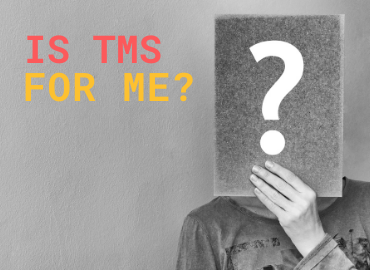Important Questions, Important Answers
Pursuing a new medical regimen is always a decision that should be made with care and professional input. How do you know if transcranial magnetic stimulation (TMS) is right for you? TMS is a very new treatment in the world of neuromodulation, being approved by the FDA as safe for the public in 2008. Many studies are underway to increase the range of maladies TMS can help with, but the public at large still knows little about TMS.
Why People Use TMS
TMS is currently approved by major medical health insurance carriers for use on treatment resistant major depressive disorder, or MDD. Treatment resistant MDD is what it sounds like—diagnosed major depressive disorder that isn’t responding to more common treatments like medication enough to give the patient a better quality of life, whether the treatments used to work or never did.
Treatment resistant MDD is a source of suffering for the patients and their loved ones. If we can offer an option that hasn’t yet been explored, that’s what we want to do. Some reasons why our patients use TMS are:
- The success rate is high. Thousands have achieved remission.
- TMS is an excellent addition to other forms of therapy, like cognitive behavioral therapy (CBT).
- As mentioned, TMS is covered by major medical carriers for use on diagnosed MDD that has proved treatment resistant.
- TMS is an efficient procedure that is non-invasive with no sedation or downtime.
- TMS is well-tolerated. The vast majority of patients experience nothing worse than a slight headache that goes away quickly. Most feel only a scratchy or tingling sensation on the scalp that goes away after the treatment session ends.
- TMS does not carry the side effects of many antidepressant medications, like lethargy and sexual dysfunction. Also, some medications are not useful for the patient due to the presence of other medications or physical conditions that will interact badly.
When TMS Isn’t the Right Option
Transcranial magnetic stimulation isn’t right for everyone. The following are some situations in which medical professionals will not offer TMS.
- TMS is approved for patients 18 years and older.
- If the individual has metallic implants and/or devices like stents and aneurysm clips. Metal braces and dental implants aren’t a problem.
- If the patient has a history of seizures or have had significant traumatic brain injuries (TBIs).
- If the patient has a condition for which TMS is not approved, such as bipolar disorder. Research is underway to see if we can make it possible for a bipolar patient to receive TMS
Don’t Wait to Feel Better
If this resonates with you, see your general physician first. A physical examination is useful to rule out physical factors that could be affecting your situation and could affect methods of treatment, such as certain medications being unsuitable. Your physician can then make recommendations to specialists, order more tests, and communicate with other professionals to share records and updates.
If an option for easing your treatment resistant MDD is open to you, don’t pass up an act of self care. Take that step forward to help yourself, because you are important, there are people around you who want you to feel better, and the world needs you.
To describe your needs and ask questions, call (585) 442-6960 or contact us here any time. If you or a loved one are in crisis, call SAMHSA’s hotline at 1-800-662-HELP (4357) or the National Suicide Prevention hotline at 1-800-273-TALK (8255).





